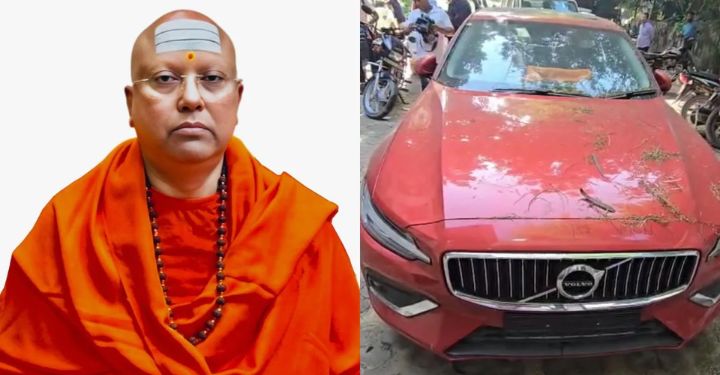In a case sending shockwaves through Delhi’s spiritual and academic circles, a self‑styled spiritual leader—widely referred to as “Delhi Baba”—is under investigation after 17 women levelled allegations of molestation, harassment, and abuse. Compounding the allegations is the discovery that his car carried fake diplomatic or embassy number plates, stirring deeper questions about privilege, authority, and impunity.
The Accusations: Scale and Nature
The accused has been identified as Swami Chaitanyananda Saraswati (alias Partha Sarathy). He holds a directorial role at an institute purportedly linked to an ashram in Vasant Kunj, Delhi. The institute offers postgraduate management diploma courses, many of which are purportedly under an EWS (Economically Weaker Section) scholarship scheme.
Multiple students, particularly women enrolled under that scheme, report being vulnerable to advances, verbal pressure, and uninvited physical contact. Among the 32 women who gave statements, 17 have formally accused him of:
- Molestation or inappropriate touching,
- Sending lewd or threatening messages,
- Verbal harassment and stalking-like behavior,
- Being coerced or intimidated into silence by administrative or institutional pressure.
Some complainants claim that faculty or administrative staff discouraged them from blowing the whistle, warning of reputational harm or academic consequences.
The Suspicious Vehicle: Fake Diplomatic Plates
In a startling turn, investigators discovered that the leader’s car bore plates that mimicked embassy or diplomatic registrations. Initial scrutiny suggests that these plates are likely counterfeit or fraudulently obtained.
The use of such plates, if proven false, could serve multiple illicit objectives: evading traffic stops or verification checks, signaling immunity or special status, or deterring law enforcement interference. For investigators and the public alike, this raises deeper concerns about the lengths to which the accused may have gone to cloak his actions under a façade of legitimacy.
Investigations and Legal Steps
Delhi Police have registered a formal case and launched investigations along several lines:
- Collecting victim testimonies, corroborating evidence (messages, call logs, CCTV footage).
- Forensic examination of the vehicle and validation of the license plates.
- Auditing institutional records of the ashram and associated educational institute.
- Interviewing staff or administrators who may have been complicit or involved in pressuring victims.
- Searching for any paper trail or documentation used to procure the questionable diplomatic-style plates.
Although formal arrest has not been publicly confirmed (as of the latest reports), investigators indicate that charges under sections applicable to sexual harassment, intimidation, fraud, impersonation, and document forgery may be pursued.
Institutional Accountability & Complicity
A key dimension in this case is the alleged role of staff and the institution. Multiple complainants say that internal pressure was applied to suppress complaints. Some were threatened that raising such issues would jeopardize their professional or academic standing.
Should the institution itself be found complicit—by discouraging reporting, hiding evidence, or shielding the accused—it may become a party to negligence or obstruction. The internal governance, oversight mechanisms, and complaint redressal systems of the ashram and institute are likely to come under intense spotlight.
Legal and Social Implications
This case is noteworthy not only because of the number of accusers, but also because it intertwines sexual misconduct with possible identity/diplomatic fraud—a rare and dangerous combination. The fallout could affect multiple domains:
- Justice for victims: Their safety, anonymity, and ability to testify freely (without retaliation) will be crucial.
- Precedent: A successful prosecution may signal that neither spiritual sanctity nor diplomatic façades can protect wrongdoers.
- Regulation of spiritual institutions: This may intensify demands for oversight, transparency, and legal accountability in religious/spiritual organizations.
- Diplomatic symbolism abuse: If misuse of embassy or diplomatic plates is confirmed, it underlines how misrecognition or false privileges can be weaponized.
Challenges in Prosecution
- Evidentiary burden: Proving molestation, harassment, and coercion often relies heavily on witness testimony, corroborating materials (messages, videos), and consistent accounts.
- Power differential: The accused’s spiritual status and institutional control may intimidate or silence victims.
- Forensic complexity: Establishing that plates are counterfeit, tracing their origin, and linking them to the accused’s misuse can be technically demanding.
- Institutional resistance: The ashram or educational body might attempt to protect its reputation, complicating access to records or influence over witnesses.
Looking Ahead
As investigators dig deeper, public attention continues to mount. The case raises urgent questions: Can people in positions of spiritual or moral authority be held to the same legal standards as any ordinary citizen? If false diplomatic identity can shield misuse, how many other abuses may go undetected?
In the coming weeks and months, the following will be pivotal:
- The credibility and protection of the complainants,
- The strength of digital, forensic, and third-party evidence,
- The legal strategy adopted (charges filed, court filings, bail, cross‑examination),
- Institutional transparency and cooperation,
- Public and media scrutiny, which may either help accountability or endanger sensitive witnesses.
In sum, the case against the Delhi Baba is not just about the 17 women who have accused him—it is a test of legal institutions, the boundaries of spiritual authority, and whether claims of divine or diplomatic privilege can be used to evade responsibility. The eyes of the public and judiciary will be watching closely as evidence unfolds.

